Related Research Articles

A floating production storage and offloading (FPSO) unit is a floating vessel used by the offshore oil and gas industry for the production and processing of hydrocarbons, and for the storage of oil. An FPSO vessel is designed to receive hydrocarbons produced by itself or from nearby platforms or subsea template, process them, and store oil until it can be offloaded onto a tanker or, less frequently, transported through a pipeline. FPSOs are preferred in frontier offshore regions as they are easy to install, and do not require a local pipeline infrastructure to export oil. FPSOs can be a conversion of an oil tanker or can be a vessel built specially for the application. A vessel used only to store oil is referred to as a floating storage and offloading (FSO) vessel.
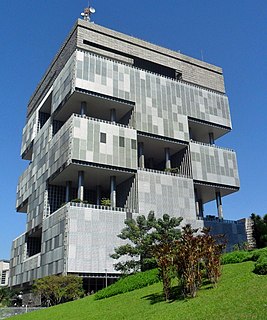
Petróleo Brasileiro S.A., better known by the acronym Petrobras, is a state-owned Brazilian multinational corporation in the petroleum industry headquartered in Rio de Janeiro, Brazil. The company's name translates to Brazilian Petroleum Corporation — Petrobras.
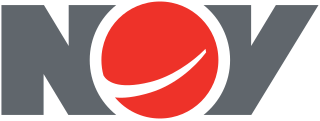
NOV Inc., formerly National Oilwell Varco, is an American multinational corporation based in Houston, Texas. It is a worldwide provider of equipment and components used in oil and gas drilling and production operations, oilfield services, and supply chain integration services to the upstream oil and gas industry. The company conducts operations in more than 500 locations across six continents, operating through three reporting segments: Rig Technologies, Wellbore Technologies, and Completion & Production Solutions.

Technip S.A. was a company that carried out project management, engineering and construction for the energy industry; in 2017 it completed a merger with FMC Technologies to form TechnipFMC. Its headquarters were in the 16th arrondissement of Paris. It has about 38,000 employees and operates in 48 countries.

Acergy S.A. was an international offshore seabed to surface engineering and construction company previously known as Stolt Offshore and Stolt Comex Seaway and was part of the Stolt-Nielsen Group until 2005. The company was registered in Luxembourg and had its headquarters in London in the United Kingdom as well as offices in Stavanger, Norway; Aberdeen, United Kingdom; Suresnes, France; Houston, United States; Rio de Janeiro, Brazil; Perth, Australia; St. John's, Canada and Singapore. The company was listed on the Oslo Stock Exchange and NASDAQ. In 2011 the firm merged with Cayman Islands-based Subsea 7, Inc. to create Subsea 7 S.A.

Subsea 7 S.A. is a Luxembourgish-domiciled subsea engineering, construction and services company serving the offshore energy industry. The company is registered in Luxembourg with its headquarters in London.
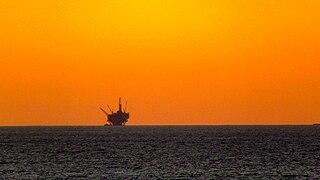
Offshore drilling is a mechanical process where a wellbore is drilled below the seabed. It is typically carried out in order to explore for and subsequently extract petroleum that lies in rock formations beneath the seabed. Most commonly, the term is used to describe drilling activities on the continental shelf, though the term can also be applied to drilling in lakes, inshore waters and inland seas.

Brazil is the largest energy consumer in South America. It is the most important oil and gas producer in the region and the world's largest ethanol fuel producer. The government agencies responsible for energy policy are the Ministry of Mines and Energy (MME), the National Council for Energy Policy (CNPE), the National Agency of Petroleum, Natural Gas and Biofuels (ANP) and the National Agency of Electricity (ANEEL). State-owned companies Petrobras and Eletrobras are the major players in Brazil's energy sector, as well as Latin America's.

Equinor ASA is a Norwegian state-owned multinational energy company headquartered in Stavanger. It is primarily a petroleum company, operating in 36 countries with additional investments in renewable energy. In the 2020 Forbes Global 2000, Equinor was ranked as the 169th-largest public company in the world. The company has about 20,200 employees.

The Bouri Offshore Field is part of Block NC-41, which is located 120 kilometers (75 mi) north of the Libyan coast in the Mediterranean Sea. It was first discovered in 1976 at a depth of 8,700 feet (2,700 m) and is estimated to contain 4.5 billion barrels (720,000,000 m3) in proven recoverable crude oil reserves and 3.5 trillion cubic feet (99 km3) of associated natural gas with an annual production potential of 6 billion m³. Bouri is considered the largest producing oilfield in the Mediterranean.
The Tupi oil field is a large oil field located in the Santos Basin, 250 kilometres (160 mi) off the coast of Rio de Janeiro, Brazil. The field was originally nicknamed in honor of the Tupi people and later named after the mollusc, however it was also ambiguously similar to the name of former Brazilian president Luiz Inacio Lula da Silva. It is considered to be the Western Hemisphere's largest oil discovery of the last 30 years.
NKT A/S is an industrial holding company with interests in power cables and wires as well as optical components, lasers and crystal fibres.
Roncador oil field is a large oil and gas field located in the Campos Basin, 125 km (78 mi) off the coast of Brazil, northeast from Rio de Janeiro. It covers a 111 km2 (43 sq mi) area and reaches depths between 1,500 and 1,900 metres.
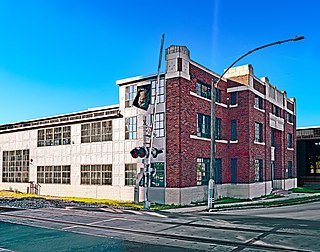
Cameron International Corporation though now operating under Schlumberger, is a global provider of pressure control, production, processing, and flow control systems as well as project management and aftermarket services for the oil and gas and process industries. Cameron was acquired by Schlumberger (SLB) in 2016, and now operates as 'Cameron, a Schlumberger Company.' At the start of the SLB acquisition in 2015, Cameron employed approximately 23,000 people and delivered $9.8 billion in revenue.
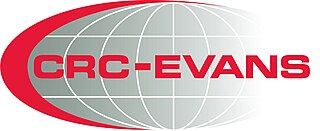
CRC-Evans Pipeline International is a division of Stanley Oil & Gas, part of Stanley Black & Decker, a Fortune 500 American manufacturer of industrial tools and household hardware headquartered in New Britain, Connecticut. Stanley Black & Decker is the result of the merger of Stanley Works and Black & Decker on March 12, 2010. CRC-Evans supplies energy infrastructure technology and services to the oil and gas industry and owns approximately 129 patents. The company maintains strategic agreements with key onshore and offshore contractors such as Tenaris, Technip, and Subsea 7.

Sapura Energy Berhad is a Malaysian integrated oil and gas services company based in Seri Kembangan, Selangor. Sapura Energy trades in over 20 countries, such as China, Australia, United States of America, and those in Western Africa and the Middle East, employing approximately 13,000 people. Sapura Energy's operations cover exploration, development, production, rejuvenation, decommissioning, and abandonment. The company was formed via a merger between SapuraCrest and Kencana in May 2012 and trades on the Main Market of Bursa Malaysia Securities Berhad. The company was renamed as Sapura Energy Berhad on 24 March 2017.

GE Oil & Gas was the division of General Electric that owned its investments in the petroleum industry. In July 2017, this division was merged with Baker Hughes.
OneSubsea is a Schlumberger company, headquartered in Houston, Texas, United States. The company is a subsea supplier for the subsea oil and gas market.
TechnipFMC plc is a French-American, UK-domiciled global oil and gas company that provides complete project life cycle services for the energy industry. It was ranked 23rd among world's Top 225 International Design Firms in the year 2017 by Engineering News-Record. The company was formed by the merger of FMC Technologies of the United States and Technip of France that was announced in 2016 and completed in 2017. TechnipFMC acts in three distinct segments: subsea, offshore/onshore, and surface projects. These projects include offshore oil and gas exploration and extraction platforms, rigs, crude oil refinery, petrochemical plants such as Ethylene, Hydrogen, SynGas plants, Naptha, Benzene etc. plastics & rubber industry, fertiliser plant, onshore as well as floating LNG plants. The company is legally domiciled in the UK, and has major operations in Houston and Paris where its predecessor companies were headquartered. It has about 23,000 employees from 126 nationalities and operates in 48 countries. TechnipFMC stock is listed on the NYSE and Euronext Paris exchange, and is a component of the CAC Next 20 and the Dow Jones Sustainability Index. The French government owns a 4 percent stake in the company.
A cable protection system (CPS) protects subsea power cables against various factors that could reduce the cable's lifetime, when entering an offshore structure.
References
- ↑ "Denmark: NOV Finalizes Acquisition of NKT Flexibles". Offshore Energy Today. April 4, 2012. Retrieved March 28, 2022.
- ↑ "NOV buys NKT Flexibles". Offshore. February 3, 2012. Retrieved March 28, 2022.
- ↑ NKT A/S (May 30, 2011). "NKT Flexibles is awarded 9.7 billion DKK frame agreement by Petrobras and will build a local flexible pipe plant in Brazil". GlobeNewswire (Press release). Retrieved March 28, 2022.